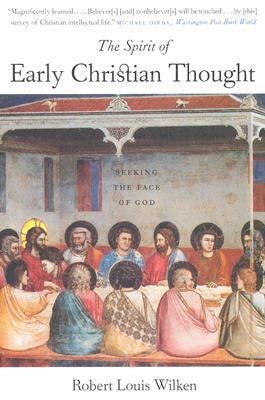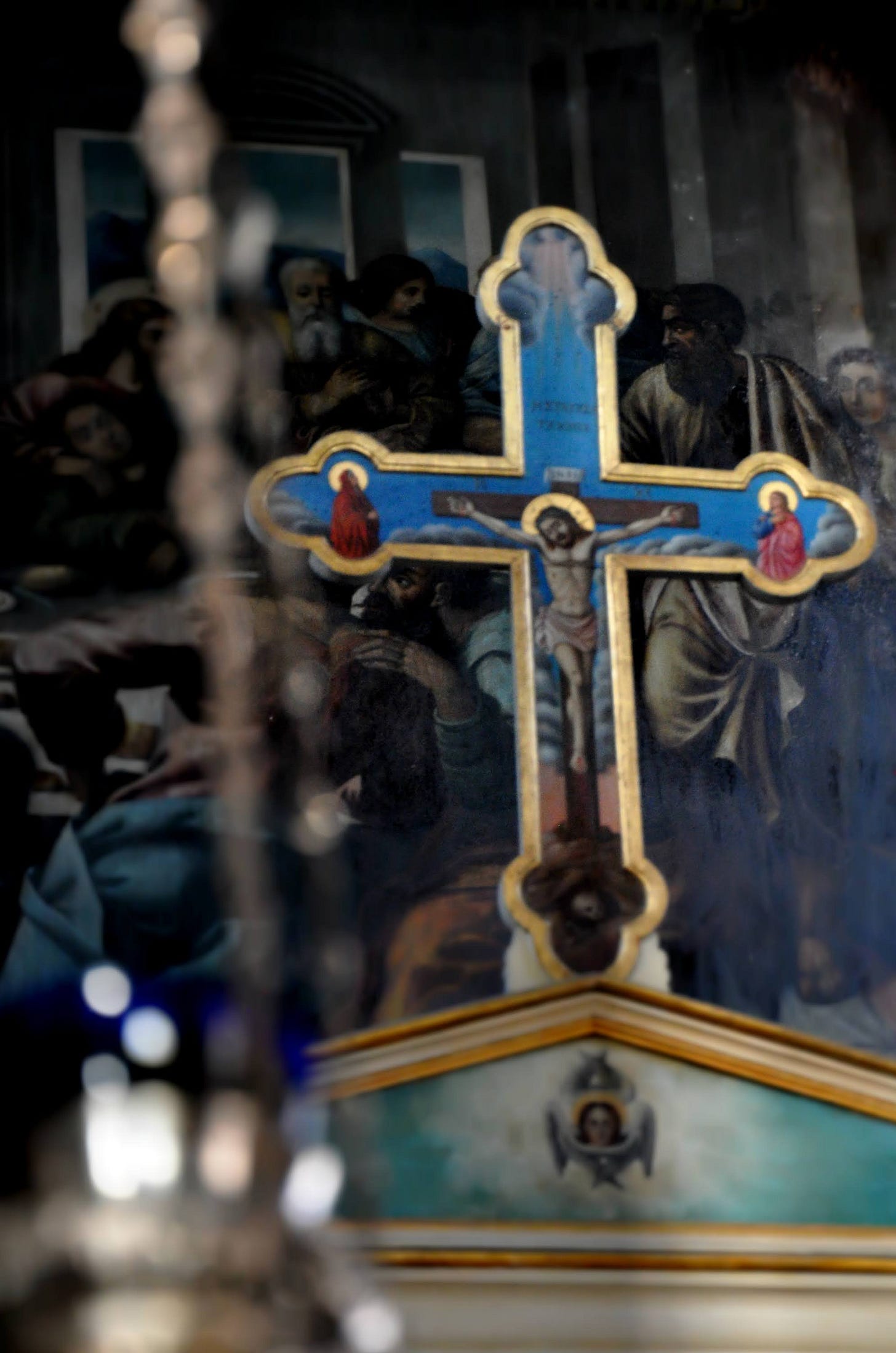In the Books: Anaphora as Narrative in Early Christian Thought
Reading Robert Louis Wilken's The Spirit of Early Christian Thought
On a long road trip over the holidays, I began listening to the audio version of The Spirit of Early Christian Thought: Seeking the Face of God by religious historian Robert Louis Wilken.1
In this sprawling survey, Wilken communicates to general readers not only the intellectual and philosophical sophistication of early Christian thought but also the practices of prayer and worship that formed its originators.
While he includes many figures (most of them male, and clergy members) from the first handful of centuries of Christian history, he particularly draws from Origen, Gregory of Nyssa, Augustine, and Maximus the Confessor.
“The goal” writes Wilken of these thinkers, “was not only understanding but love, and at various points in the book . . . I have tried to show the indispensability of love to Christian thinking” (xviii).
Each chapter focuses on a dominant theme in these writings, proceeding from core doctrinal topics (how God is known, worship and sacraments, Trinity, the Scriptures) to areas of practical spiritual importance (the virtues, the passions, and how to face them).
Anaphora as Narrative
What realy drew me in was Chapter 2, in which Wilken explores early liturgical worship of the Church as the context for its theology and thought. (Wilken draws from the ancient Liturgy of St. James, the predecessor to the Liturgies of St. Basil and St John Chrysostom commonly used in Eastern Orthodox churches today.)
“Christian thinkers were men of prayer who knew the person of Christ not only as a historical memory, but as a fact of experience in the liturgy, in which the events recorded in the gospels, particularly the death and Resurrection of Christ, were ‘made present.”2
The most sacred point in the Liturgy of the Early Church (as today) was the Anaphora (prayer of thanksgiving or offering), when the bread, water, and wine are offered for consecration, becoming the true body and blood of Christ.
Lifting the Eucharistic bread and wine to heaven, the priest prays:
Making remembrance of his life-giving sufferings, his saving cross and death, his burial and resurrection on the third day from the dead, and his session at the right hand of You his God and Fatehr, and his second glorious and fearful coming … we offer to You O Lord,, this awesome and unbloody sacrifice.
(From the Liturgy of St. James, as qtd in Wilken, p 26)
It is from this prayer that the book I am writing takes its title, Remembering All These Things, a rendering of the first words of the prayer above from more contemporary translations of the Divine Liturgy.
I chose this title because every time I hear these words from the Anaphora prayer, they remind me that the Christian faith is one that remembers, that is, re-members the past rather than dis-membering it, pulling it apart or blocking off chunks of it or devaluing it. Or forgetting it altogether.
While trauma disrupts or dismembers our life story, the Liturgy provides a model for re-membering, reconstituting our narrative in and through the salvific narrative of the biblical story.
As Wilken writes, this prayer “has a distinct narrative structure” akin to the Psalms of Thanksgiving, such as Psalm 150 (32). “The psalmists do not simply praise the majesty and goodness and power of God, they identify God by his actions, ‘his mighty deeds’” (33).
Similarly, the Anaphora retells, “in capsule form,” the entire salvific history of the cosmos, from creation to the giving of the Law, the people of Israel, the coming of Christ on to his death, Resurrection, and coming again. Wilken concludes “To praise God is to narrate what he has done” (33).
This is not simply a historical exercise, but a work of anamnesis, the act of recalling by making present. Just as Jewish celebrants of the Passover are not simply spectators (here Wilken refers to a passage from the Mishnah from Rabbi Gamaliel), so those who partake of the Eucharist make the saving life and death of Christ present among them.
“[I]n the Eucharist the life-giving events of Christ’s death and Resurrection escape the restrictions of time and become what the early church called mysteries, ritual actions by which Christ’s saving work is re-presented under the veil of the consecrated bread and wine” (34).
“This,” writes Chrysostom, “is done as a remembrance [anamnesis] of that which was done. . . We do not offer another sacrifice as the priest offered of old, but we always offer the same sacrifice. Or rather we re-present the sacrifice.”
I am still thinking about the universe of meaning that lies behind this simple phrase, “remembering all these things…” Wilken’s work has been another step in this process, so I thought I’d share it here.
For now, it seems that in calling me to remember the scourges of Christ’s past, the Anaphora prayer gives me the permission to remember my own wounds as well. But it calls me to do this rightly, within the larger context of Christ’s saving acts. While trauma dis-members the past, the Anaphora—indeed Liturgy, the Christian life as a whole—puts it back together, gathers it, teaches me to offer it up to the God who remembers and saves.
NOTE: In this Substack, “In the Books” posts explore specific books that have given me something to think about when it comes to trauma, healing, theology, and/or faith practices after trauma.
(New Haven: Yale University Press, 2003), 398 pp.
Ibid., xx. The point that liturgy ‘makes present’ events of the past is a crucial one, particularly in the context of trauma—how Liturgy might serve as a way to re-learn how to be with our own past. As Wilken states: “Christian liturgy was a celebration of the presence of the living Christ. It is not a memorial meal commemorating something that happened in the past. As Augustine said in a sermon on Psalm 22, the great psalm of Christ’s passion, the liturgy ‘makes present what took place in time past, and in this way it moves us as if we were actually watching our Lord hanging on the cross’’ (31). Unfortunately Wilken fails to cite this quotation from Augustine, and this wording as such is not found in that saint’s Exposition on Psalm 22. While the point of the “present” nature of the Liturgy is a valid one, and we can look to other points and writings as evidence, it’s frustrating when quotes like this get attributed and misattributed to the Fathers.






"While trauma dis-members the past, the Anaphora—indeed Liturgy, the Christian life as a whole—puts it back together, gathers it, teaches me to offer it up to the God who remembers and saves."
Thank you.
Thanks for this perspective. This happens to be one of my very favorite books.